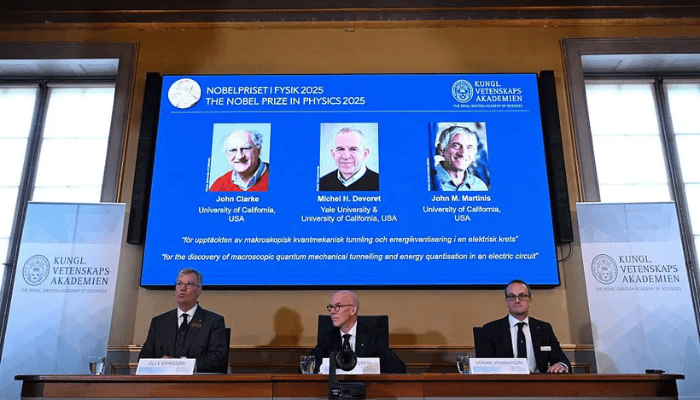Nobel Prize in Physics 2025 awarded to trio for quantum mechanics discoveries
John Clarke, Michel H Devoret and John M Martinis are announced as winners of the 2025 Nobel Prize in Physics, by the Royal Swedish Academy of Sciences, at a news conference in Stockholm, Sweden, October 7, 2025 [Reuters]
Three United States based scientists have won the 2025 Nobel Prize in Physics for research that helped turn one of science’s most mind-bending theories into practical technology, the kind now powering the next generation of computers.
The Royal Swedish Academy of Sciences on Tuesday awarded the prize to John Clarke, Michel H. Devoret, and John M. Martinis for their discovery of macroscopic quantum mechanical tunnelling and energy quantisation in an electric circuit.
Read also: Immune system breakthrough wins 2025 Nobel medicine prize for US, Japan scientists
In simpler terms, their experiments showed that the bizarre rules governing the subatomic world — where particles can appear to pass through barriers and exist in two states at once — also apply to larger, man-made systems like electrical circuits. That realisation, made through painstaking work in the 1980s, laid the foundation for modern quantum technology, from ultra-secure communications to quantum computing.
A theory brought to life
Quantum mechanics explains how the tiniest building blocks of the universe behave, often defying classical logic. It is the reason electrons can jump between energy levels and why light behaves as both a wave and a particle.
For decades, these strange principles seemed confined to the realm of theory and microscopic experiments. But Clarke, Devoret, and Martinis showed they could be observed and controlled in everyday electrical circuits.
Read also: Nobel prize nominee, Zuriel Oduwole, to headline Sterling Leadership Series
Their findings proved that “quantum tunnelling” — the process by which particles slip through barriers that should be impenetrable — could be made visible and measurable on a macroscopic scale. This breakthrough has since become the cornerstone for technologies such as superconducting qubits, the building blocks of quantum computers.
“This is something that leads to the development of the quantum computer,” said Professor Clarke, speaking by phone moments after learning of his award. “Many people are working on quantum computing — our discovery is in many ways the basis of this.”
From Cambridge to California
Clarke, born in Cambridge, United Kingdom, is now a professor at the University of California, Berkeley. Devoret, born in Paris, France, teaches at Yale University, while Martinis is a professor at the University of California, Santa Barbara.
The trio will share prize money of 11 million Swedish kronor (about £872,000). The award will be formally presented by Sweden’s King Carl XVI Gustaf at a ceremony in Stockholm on December 10, the anniversary of Alfred Nobel’s death.
“To put it mildly, it was the surprise of my life,” Clarke told reporters, calling his fellow laureates’ contributions “overwhelming.”
Read also: Stop making one-time pledge, nobody believes you, El-Rufai tells Obi, Amaechi
To the average person, “macroscopic quantum tunnelling” might sound like the stuff of science fiction. But it has very real-world implications.
“Even mobile phones, cameras, and fibre-optic cables rely on quantum mechanics,” noted the Nobel committee in its announcement. “There is no advanced technology used today that does not.”
Olle Eriksson, chair of the Nobel Committee for Physics, said it was “wonderful to be able to celebrate the way that century-old quantum mechanics continually offers new surprises”.
Lesley Cohen, Associate Provost of Physics at Imperial College London, said the recognition was “well deserved”.
“Their work has laid the foundations for superconducting qubits — one of the main hardware technologies for quantum technologies,” she said.
The Nobel Prize in Physics is widely considered the most prestigious in its field. Its past recipients include Albert Einstein, Marie Curie, Niels Bohr and Max Planck — names synonymous with the birth of modern physics.
Last year’s physics award went to John Hopfield and Geoffrey Hinton for pioneering work that helped fuel today’s artificial intelligence revolution.
The 2025 Nobel season continues this week, with the chemistry prize announced on Wednesday, followed by the literature, peace and economics awards in the coming days.
For Clarke and his colleagues, the recognition caps decades of quiet work that has transformed how humanity understands — and harnesses — the strange rules of the quantum world.
As Clarke put it, still dazed by the news: “Exactly where this fits in right now isn’t entirely clear to me. But one of the underlying reasons that cellphones work is because of all this work.”

